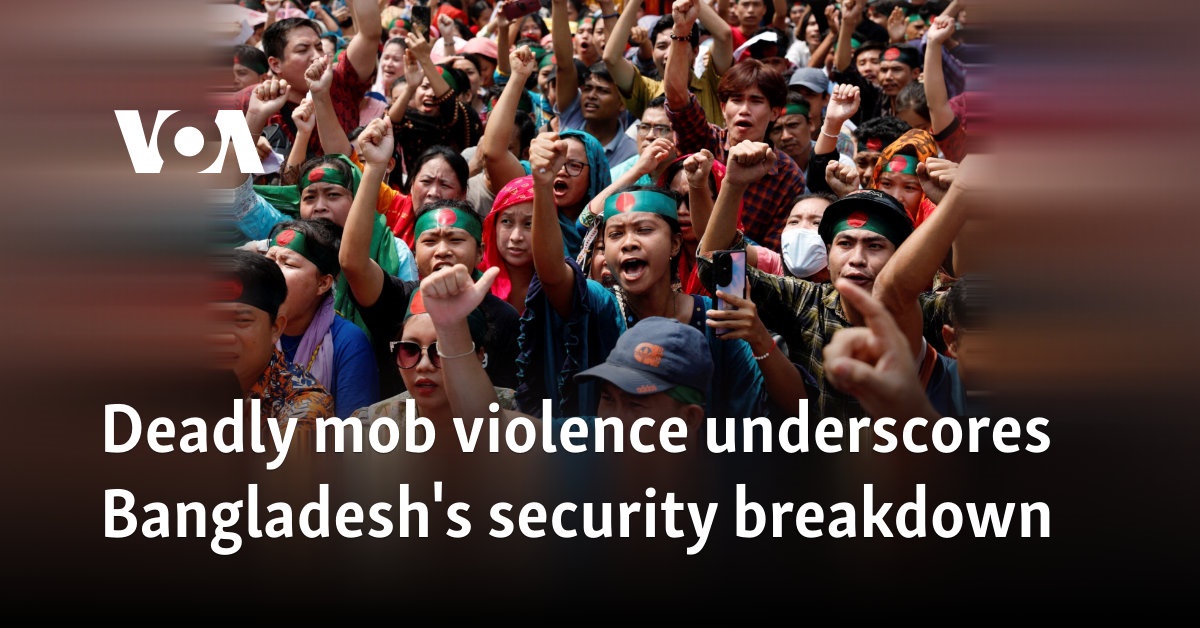
This article was originally published on VOA News - Extremism. You can read the original article HERE

A brutal mob lynching at Bangladesh’s oldest university has put a spotlight on the country's crumbling law and order, just as its fledgling interim government tries to assert control and push through sweeping institutional reforms.
Late Wednesday, Tofazzal Hossein, a man known for struggling with mental health issues and roaming around the 102-year-old University of Dhaka, wandered into a residential hall.
Accusing him of theft, a mob of students grabbed and savagely beat him over the course of several hours.
By Thursday morning, Hossein, 35, was dead, the latest casualty in a wave of mob violence that has gripped Bangladesh since student protests ousted Prime Minister Sheikh Hasina and sent her fleeing the country last month.
Mob violence and student vigilantism were commonplace during Hasina’s 15-year reign. Rights group Ain o Salish Kendra documented 32 mob killings between January and June, even before student protests toppled her government and left more than 1,000 people dead.
But the lawlessness has spiraled out of control since the August 5 fall of the government. In the days that followed, police officers, fearful of student reprisals, vanished from the streets, creating a vacuum that has yet to be filled.
In just five weeks since early August, 21 people were lynched across the country, according to a tally by the Daily Star, a leading Bangladeshi newspaper. One of the victims, a former student leader accused of attacking protesters in July, was himself beaten to death at another major university on Wednesday.
University students, once hailed as democratic heroes, now stand accused of committing mob violence. Six face charges over Hossein's murder, with seven more implicated in the second case.
The lawlessness has spread nationwide, leading to numerous incidents of extortion, harassment, intimidation and courtroom violence, sometimes triggering larger conflicts.
In Bangladesh’s southern Chittagong Hill Tracts region, the lynching on Wednesday of a man accused of stealing a bike reignited long-simmering tensions between ethnic Bengalis and indigenous people. The ensuing violence has already claimed at least four lives, according to media reports.
The unrest comes just days after the interim government, led by Nobel laureate Muhammad Yunus, granted the army sweeping law enforcement powers to restore order. At stake are more than domestic peace and the stability of the country's industrial regions. Yunus' six-week-old government has set up six commissions to advance democratic reforms, including a panel tasked with changing the country’s 51-year-old Constitution.
The instability in Bangladesh, South Asia's third-most-populous country, is also drawing regional scrutiny, with Indian politicians voicing concern about reports of attacks on Hindus.
The Bangladeshi army's 60-day new powers, announced Tuesday, allow commissioned officers to act as “executive magistrates,” making arrests, conducting searches, dispersing unlawful assemblies and opening fire in extraordinary circumstances.
Asif Nazarul, the interim government’s law adviser, said the government acted in response to “subversive acts” and instability, particularly in the country's industrial areas.
“Given the situation, army personnel have been given magistracy power,” Nazarul was quoted in the Daily Star.
Rattled by growing insecurity, many Bangladeshis have welcomed the army’s new power.
Noting that security remains a “big challenge” for the interim government, Badiul Alam Majumdar, editor of Citizens for Good Governance, told VOA, “It has been done to maintain law and order in view of the overall situation. It has been done temporarily. I hope the position will change.”
Accused of using violence during the anti-government protests, Bangladeshi police became targets of student anger after Hasina’s ouster. Police stations were looted, and several officers were killed or burned to death, their bodies hanged from overpasses.
With no one held accountable in those cases, police fear for their safety. Many have yet to return to their posts, leaving the police forces understaffed and barely functioning.
Julia Bleckner, a senior Bangladesh researcher at Human Rights Watch, said while the government has a responsibility to maintain law and order, giving the army “unchecked” powers raises concerns about abuse.
“They've been given a mandate to carry out pretty widespread and arbitrary searches, detentions and arrests,” Bleckner said in a phone interview with VOA.
The army can now arrest anyone on the spot for “disturbing the peace” and use civilian personnel to disperse “illegal assemblies,” Bleckner noted.
“We are under a new government that has made massive commitments and very important commitments to human rights, but these are the same security forces that have carried out abuses for decades,” Bleckner said.
The Bangladeshi army last wielded similar law enforcement powers during the country’s 2006-2008 political crisis. At the time, military personnel were accused of making arbitrary arrests and other human rights abuses.
Nazarul, the law adviser, said he did not believe the army would “misuse this authority,” according to the Daily Star.
But critics remain unconvinced.
“It is not right,” ZI Khan Panna, a veteran lawyer, said of the army’s magistracy power, according to the Daily Star. “Has the government lost confidence in the magistrates? It is not right for army personnel to perform magistrate's duties under the deputy commissioners. It would not be wise to mix army personnel with the general public."
In the three days since receiving policing powers, the army has not announced any arrests. However, it has faced criticism for failing to quell violence.
Nolen Deibert, head of Freedom House’s Asia Religious and Ethnic Freedom Program, noted that the attacks against indigenous communities in the Chittagong Hill Tracks region came as “the army allegedly stood by and watched.”
The interim government's home affairs adviser, Jahangir Alam Chowdhury, said a high-level committee will be formed to investigate the violence, Reuters reported.
“The country faces real risks of heightened conflict and threats of violence toward minority groups,” Deibert said via email. “The interim government must come up with a plan to return policing powers to civilian authorities who will fairly protect and serve all Bangladeshis, regardless of race or creed.”
VOA’s Bangla Service contributed to this article.
This article was originally published by VOA News - Extremism. We only curate news from sources that align with the core values of our intended conservative audience. If you like the news you read here we encourage you to utilize the original sources for even more great news and opinions you can trust!






Comments